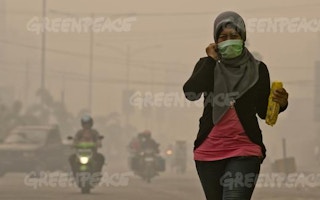The haze in Singapore reached hazardous levels on Thursday afternoon, with the Pollutant Standards Index (PSI) hitting a new record of 371 at 1pm.
To continue reading, subscribe to Eco‑Business.
There's something for everyone. We offer a range of subscription plans.
- Access our stories and receive our Insights Weekly newsletter with the free EB Member plan.
- Unlock unlimited access to our content and archive with EB Circle.
- Publish your content with EB Premium.
Visibility was poor in most parts of the island and the government has urged citizens to limit outdoor activities, especially those with heart or lung conditions even as it prepared its hospitals for an increase in the number of patients. The PSI measures air quality and anything above 300 is considered very unhealthy.
The Ministry of Health is believed to be considering shutting down childcare centres. Principals of these schools have been contacting parents about the possibility of having to make alternative arrangements for their children.
An Inter-Agency Haze Task Force comprising 23 government agencies has also been activated.
Prime Minister Lee Hsien Loong said on Thursday to local media that the government will help needy Singaporeans with their medical bills should they fall sick from the haze. Citizens who qualify and who suffer from respiratory problems or conjunctivitis because of the haze only have to pay $10.
A Haze Inter-Ministerial Committee has also been set up to tackle the haze problem.
Minister for the Environment and Water Resources Vivian Balakrishnan had some harsh words about the situation on Wednesday night.
“This is now the worst haze that Singapore has ever faced. And no country or corporation has the right to pollute the air at the expense of Singaporeans’ health and wellbeing,” he wrote in a post on Facebook.
Dry weather conditions in the region have aggravated the burning in many spots over central Sumatra. The haze from the fires in Sumatra was brought over by prevailing winds blowing from the southwest or west, and has affected Singapore since last Thursday.
The National Environment Agency (NEA) said in a statement late Wednesday that it expects the wind and weather conditions to remain constant and therefore the haze will persist.
Meanwhile, Indonesia’s Coordinating Minister for People’s Welfare Agung Laksono has hit back at Singapore, saying: “Singapore shouldn’t be like children, in such a tizzy”, according to local media reports.
Singapore officials have in the past week called on Indonesia to do more to prevent the haze and punish companies responsible for the burning. Many of the hotspots are owned by palm oil companies or smallholder farmers who supply palm oil to these companies and use traditional ‘slash and burn’ methods to clear their land for the next planting season.
Mr Agung was quoted as saying to the press on Thursday: “Indonesian citizens also need to be looked after, there are hundreds…. It’s not what Indonesians want, it’s nature.”
He added that Indonesian authorities were putting out the fires and investigating which companies are responsible. “If there are, some are owned by Indonesians, Malaysians, Singaporeans,” he said. “We will take action if they are found responsible. But there must be a process.”
Singapore’s Prime Minister has also promised to take action against any Singapore companies or companies in Singapore responsible for causing the fires in Sumatra.
A Greenpeace International spokesperson told Eco-Business this week that some Singapore-based companies are known to source palm oil from companies involved in the fire clearing and forest destruction.
It named Wilmar International, a palm oil giant, as one who sources from its own holdings as well as smaller producers. “Duta Palma is one of these, and we have tracked this notorious palm oil producer for a few years: it is known to use fire in land clearing,” said Greenpeace.
The organisation is overlaying concession maps with the fire hotspots and might be able to identify some names, added the spokesperson.
Some other big names in the palm oil include Golden Agri-Resources, IndoAgri, First Resources, Cargill and Kencana Agri, many of which are based or listed in Singapore. Cargill issued a statement on Thursday to the press that it has a strict no-burn policy and “we can confirm that there are no hot spots or fires on our plantations in South Sumatra and West Kalimantan.”
Activist groups in Singapore have also called on the Ministry of Manpower to issue a stop-work order for all outdoor workers.
Minister for Manpower Tan Chuan Jin posted separately in a Facebook note on Thursday: “I understand the desire for immediate answers. It is not the bureaucracy or the briefings that drive things. It’s the substance of the next steps. These events are scheduled for when we anticipate some of the details would be ready, so that we can announce and explain and clarify accordingly.








